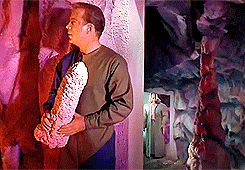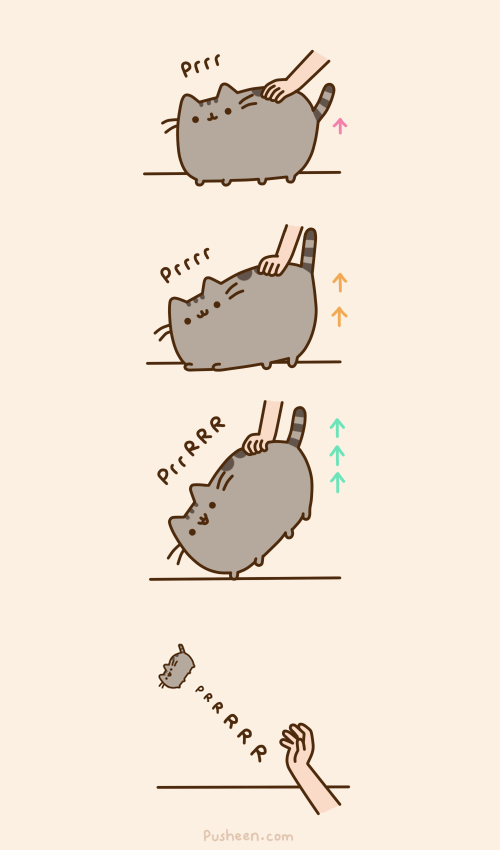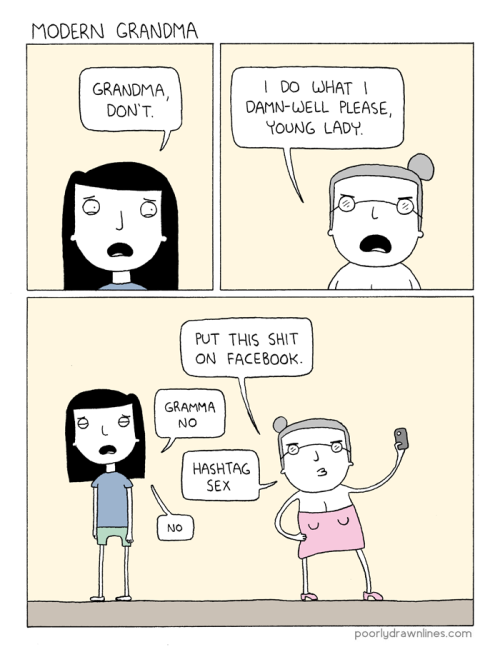Trey Peden
Shared posts
Satantic Temple Holds Gay Wedding At Westboro Baptist Family Gravesite
buzzfeed: These Brazilian kids have been learning English by...





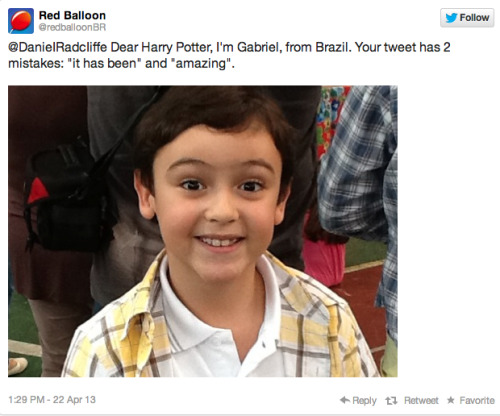


These Brazilian kids have been learning English by gently correcting celebrities’ grammar on Twitter.
this just made my life
July 16, 2013

OH GOD IT'S ALMOST SDCC TIME. We're boothing with Overdue media at 2300 and I'll be there Fri and Sat!
Why Do Mosquitoes Bite Some People More Than Others?
10 Spectacular Overhanging Rocks
If People Had Dog Behavior

Have you visited Pleated Jeans today?
If you don't want to be tased . . . .
On occasion, when police use tasers, their target dies.
Some people think that police should be better trained in the use of force, and that the use of tasers by law enforcement in general should be reconsidered and not driven by questionable taser-industry claims of safety.
Those people are soft on crime, and insufficiently vigilant about the threats posed to The Children. Will you not think of the children?
Miami Police Chief Manuel Orosa has a better suggestion to deal with folks dying when police tase them, which — I must point out — can be upsetting and inconvenient to police:
Miami Police Chief Manuel Orosa came up with a novel solution to the problem: those with heart conditions just shouldn't break the law in the first place to avoid getting Tased.
See? That's why we can count on the Thin Blue Line: because of the serious, contemplative, and principled analysis of public-safety issues we can expect from law enforcement.
Chief Orosa is right! Everyone knows that cops never question, arrest, tase, beat, or shoot you unless you committed a crime first. It's just logic. If you weren't a criminal, why would they tase you?
Chief Orosa is a very busy man, I am sure, so I will help him out by making other common-sense suggestions designed to avoid unpleasantness in interactions with law enforcement.
If you don't want police to shoot your dog when they come to notify you that your son has been murdered, then don't have a son who is a homicide victim.
If you don't want to be threatened with investigation by the District Attorney's Office, then don't charge a deputy prosecutor for lap dances, and certainly don't make him pay the cover.
If you don't want your yard dug up, don't get accused by psychics of having buried bodies there.
If you don't want your collie shot, then don't let her cross the path of a cop with a demonstrated history of violence.
If you don't want to be reduced to drinking your own urine while abandoned in custody over the weekend, don't smoke pot near a DEA facility that is understaffed.
If you don't want police knocking on your door at midnight, then be available at midnight if they want to dispute something you wrote about them in the newspaper.
If you don't want your disabled son beaten, pepper-sprayed, and tased, then get him a speech pathologist so police won't think he's dissing them. They're sensitive.
If you don't want to get kicked, then let go of the fucking ball, Rover. What's your issue?
If you don't want to be arrested, don't use a cell phone near an officer who is a Star Trek fan.
If you don't want to be pepper-sprayed and tased and "trip and fall on the pavement," then ANSWER THE GODDAM QUESTION, is that so hard?
If you don't want to be tased, then don't take an aggressive stance in bed, grandma! Jesus. You're 86, you should know better.
If you don't want your grandmother to go to prison, don't have a cold.
Really, if you've paid attention in America for the last half-century — if you've watched the law-and-order platitudes dominating politics, if you've seen the mindless worship of people who have guns and badges, if you've seen what conduct is tolerated, excused, and even cheered — all of this would really be common sense, wouldn't it?
If you don't want to be tased . . . . © 2007-2013 by the authors of Popehat. This feed is for personal, non-commercial use only. Using this feed on any other site is a copyright violation. No scraping.
Hashtag of the Day: #Sharknado
#Sharknado is trending high on Twitter today after last night's SyFy premiere of a disaster flick about a massive tornado that results in an airborne shark attack.
Submitted by: Unknown (via Know Your Meme)
The Internet - protecting the integrity of your childhood.

The Internet - protecting the integrity of your childhood.
Salon on Continuum Hypothesis
The Zimmerman Verdict: Be Careful What You Wish For
My first day as a federal prosecutor was October 3, 1995, the day O.J. Simpson was acquitted. The federal courthouse is across the street from the Criminal Courts Building, and thunderous cheers from camp O.J. interrupted our orientation session. It did not seem to bode well for a career as a prosecutor. I remember thinking that the not guilty verdict was bullshit. I felt free, at that point, to regard not guilty verdicts as racially motivated bullshit based on what I had heard about cases from TV.
I'm far less inclined to do so now.
There's no question that acquittals, as surely as convictions, can reflect entrenched injustice and oppression. If people can kill me or rob me or assault me with impunity because jurors will not convict them of doing so because of who I am, I am not free.
But experience has made me very cautious to conclude that a not guilty verdict is a result of anything but failure of evidence and the presence of doubt. That's why I — like many lawyers who actually practice criminal law — have not concluded that the acquittal of George Zimmerman represents, in and of itself, race-based injustice.
First, experience has taught me not to trust the news media, and therefore not to form confident opinions about the merits of a case based on what the media chooses to emphasize. The media in the Zimmerman case has been deceitful and sloppy. This is not a surprise. The media is good at advancing its chosen themes and bad at reporting accurately about complex legal proceedings like a criminal trial. The media rushes to judgment when a suspect or defendant "looks guilty," ignores or minimizes police and prosecutorial misconduct in order to preserve its relationships with sources (or does so because it has, despite its reputation for liberal bias, uncritically accepted law enforcement narratives and is content to act like the state's cheerleaders), obsesses over tawdry minutiae to the exclusion of substance, and remains lazy and/or defiantly ignorant and wrong about law. I have prosecuted and defended numerous cases that were covered by the media; I have never seen them get all of the details right, even on relatively straightforward matters.
Second, I've been a criminal defense attorney for 13 years now, and it's changed the way I view trials. They aren't (or at least should not be) a vehicle for society's judgment. That's the view the prosecution often hopes to promote, in order to convince jurors to vote their fears and anxieties about crime, which they are told relentlessly (and falsely) is out of control. No: a trial is an attempt by the state to exercise power over an individual, limited by the requirements of the Constitution and the rules of evidence and criminal procedure. The question at hand is can the government offer admissible evidence proving this person guilty of this crime beyond a reasonable doubt to a panel of jurors. When judges and jurors take their job seriously, it acts as an effective bulwark between the incredible power of the state and the freedom of the individual.
Third, the more I observe American culture, the less enthused I am at the notion that a jury's verdict in a criminal case is wrong if it doesn't reflect the collective beliefs of our society. Too often the collective belief of society is that people accused of something probably did it. Too often the collective belief of society is that a properly functioning justice system is one that produces a conviction. Too often the collective belief of our society is that the state, and law enforcement, are entitled to trust — not trust but verify, but uncritical trust, at least when the government actors wear a badge and carry a gun. Too often the collective belief of our society is that how we feel about a thing is entitled to legal force, even in the face of specific rights and privileges of another citizen.
Can due process produce a result that is, in some sense, unjust? Yes. People can kill and defraud and rape and abuse but leave insufficient evidence of their crimes to prove their guilt beyond a reasonable doubt. The fact that the victim suffered is unjust. The fact that the perpetrator was not punished is unjust. The fact that skin color drives outcomes is unjust. It is unjust that moral wrongs go unredressed: such as, perhaps, the moral wrong that Trayvon Martin would be alive if George Zimmerman didn't think he had a right and duty to confront people of the wrong color in his neighborhood. But there's a central question some people ignore about such injustice: compared to what?
People assail results like the acquittal of George Zimmerman. But critics don't tell us what the alternative should be. Shall guilt or innocence be determined by society's reaction to the vapid summaries of prosecutions on cable news? Clearly not. Should verdicts necessarily reflect social consensus of the time about the crime and the accused? Tell that to the Scottsboro boys — theirs did. Should we make it easier to convict people of crimes in order to reduce injustice against the weak? How foolish. The weak already suffer because it is too easy to convict — because we love to pass criminal laws, but hate to pay for an adequate defense. Thanks to "law and order" and the War on Drugs and our puerile willingness to be terrified by politicians and the media, one-sixth of African-American men like Trayvon Martin have been in prison, trending towards one-third. The notion that we can improve their status in America by making it easier to convict people and by undermining the concept of a vigorous defense is criminally stupid. The assertion that an acquittal is wrong and unjust might, in some cases, be true, in the sense that some juries will vote their ignorance or racism or indifference. But the assertion that an acquittal is by its nature unjust because of how we feel about the case serves the state — the state that incarcerates 25% of the world's prisoners.
I didn't watch much of the Zimmerman trial. The parts I watched left me unimpressed with the quality of the prosecution's case. I haven't seen any people who are actual criminal trial practitioners (with the exceptions of ones whose job is to talk to Nancy Grace and her ilk) who thought the case was going well for the prosecution. So my reaction is rather like that of the other criminal defense lawyers I know, like Brian Tannebaum and Gideon and Eric Mayer and Scott Greenfield. The verdict didn't surprise me, because based on what I know as a trial lawyer (as opposed to an occasional consumer of CNN), the prosecution wasn't proving its case beyond a reasonable doubt, given the law that applied (as opposed to the law people felt ought to apply). I don't see a basis to conclude that a jury of six women of varying backgrounds voted out of racism, rather than voting because they took the government's burden of proof seriously.
It's tragic that Trayvon Martin was killed, and I believe that George Zimmerman bears moral responsibility for his death. The banners of racism that have unfurled in defense of Zimmerman repulse me. I would be damn worried about my kids if I lived in George Zimmeran's neighborhood. But ultimately I am more afraid of the state — and more afraid of a society that thinks case outcomes should depend upon collective social judgment — than I am of the George Zimmermans of the world. Critics might say that view reflects privilege, in that as an affluent white guy I am far less likely to be shot by someone like Zimmerman. Perhaps. But I am also vastly less likely to be jailed, or be the target of law enforcement abuse tolerated by social consensus. Weakening the rights of the accused — clamoring for the conviction of those we feel should be convicted — is a damnfool way to help the oppressed.
The Zimmerman Verdict: Be Careful What You Wish For © 2007-2013 by the authors of Popehat. This feed is for personal, non-commercial use only. Using this feed on any other site is a copyright violation. No scraping.
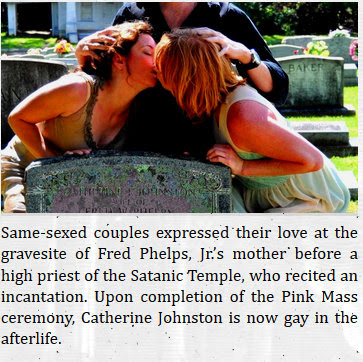



 facebook
facebook  reddit
reddit 








